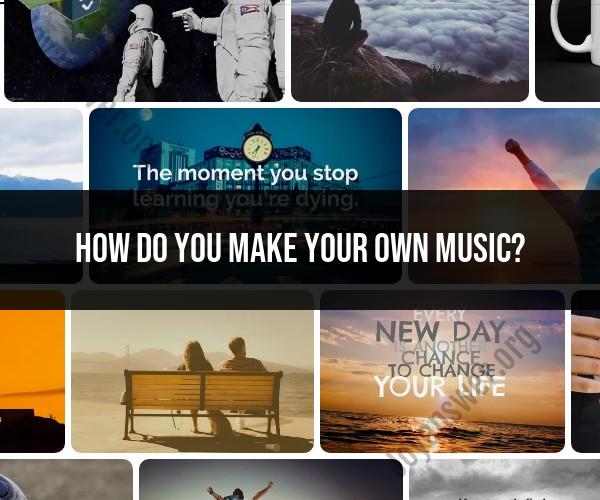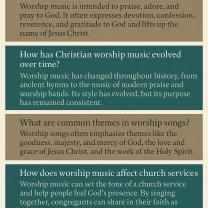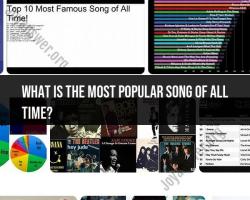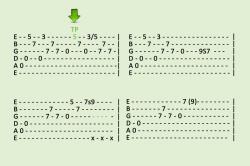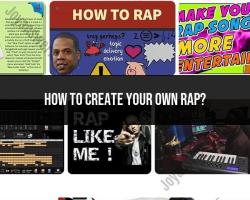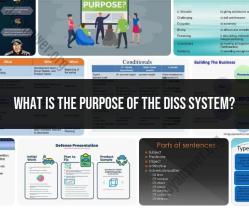How do you make your own music?
Creating your own music can be a rewarding and creative process. Whether you're a beginner or an experienced musician, here's a general guide to help you get started:
1. Define Your Musical Goals:
- Determine what kind of music you want to create. Are you interested in composing, writing lyrics, producing electronic music, or playing an instrument? Your goals will shape your approach.
2. Learn the Basics:
- If you're new to music, start by learning the fundamentals. This may include understanding music theory, chord progressions, scales, and rhythm.
3. Choose Your Instrument:
- If you're not already proficient in an instrument, consider learning one. Common choices include the guitar, piano, keyboard, drums, or your own voice.
4. Create Melodies and Chords:
- Start by experimenting with melodies and chords. This is the foundation of most music. Use your instrument, a digital audio workstation (DAW), or sheet music to compose.
5. Write Lyrics (if applicable):
- If you're creating songs with lyrics, work on your songwriting skills. Write down your thoughts, emotions, and stories in the form of lyrics.
6. Understand Music Production (if applicable):
- If you're into electronic music or recording, learn the basics of music production and sound engineering. A DAW, such as GarageBand, Ableton Live, or FL Studio, can be helpful.
7. Experiment with Sound:
- Explore different sounds and instruments. Don't be afraid to experiment and find your unique style.
8. Record Your Music:
- Record your compositions using a microphone or your DAW if you're working digitally. Pay attention to sound quality and clarity.
9. Edit and Mix Your Music:
- Use editing software to enhance the quality of your recordings. Adjust levels, add effects, and make sure everything sounds balanced.
10. Collaborate:
- Consider collaborating with other musicians. They can bring new ideas and skills to your project.
11. Practice Regularly:
- Music, like any skill, requires practice. Regular practice will improve your playing, writing, and producing.
12. Seek Feedback:
- Share your music with friends, family, or online communities. Constructive feedback can help you grow as a musician.
13. Perform and Share:
- If you're comfortable, perform your music live or share it online through platforms like YouTube, SoundCloud, or social media.
14. Keep Learning:
- Music is a lifelong journey. Continuously learn, explore new techniques, and listen to a variety of music to expand your horizons.
15. Be Patient:
- Creating music is a process, and it's normal to encounter challenges along the way. Patience and persistence are key.
Remember that there's no one right way to make music, and your style and approach will evolve over time. Your unique perspective and experiences can lead to original and captivating music. Enjoy the creative process, and don't be discouraged by setbacks. Music is a form of self-expression, and it's meant to be a joyful and fulfilling experience.
How to create your own music, regardless of your musical background
No matter what your musical background is, you can create your own music. Here are a few tips:
- Start with the basics. If you're new to music, it's helpful to learn the basics of music theory, such as rhythm, melody, and harmony. There are many resources available online and in libraries to help you learn.
- Experiment with different instruments and sounds. There are many different ways to create music. You can use traditional instruments, such as a guitar or piano, or you can use electronic instruments or software. Experiment with different sounds and see what you like best.
- Find your own style. Don't be afraid to experiment and find your own unique sound. There are no rules when it comes to creating music.
Tools and resources for making music at home or in a studio
There are many different tools and resources available for making music at home or in a studio. Here are a few examples:
- Digital audio workstations (DAWs): DAWs are software programs that allow you to record, edit, and mix your music. There are many different DAWs available, such as Ableton Live, FL Studio, and Logic Pro.
- Microphones: Microphones are used to record sound. There are many different types of microphones available, such as condenser microphones, dynamic microphones, and ribbon microphones.
- Audio interfaces: Audio interfaces connect your microphone and other instruments to your computer.
- Instruments: You can use any type of instrument to create music. Some popular instruments include guitars, pianos, drums, and synthesizers.
Steps to composing, recording, and producing your original music
Here are the basic steps to composing, recording, and producing your original music:
- Compose your music. This involves writing the melody, harmony, and rhythm of your song. You can either write your music by hand or use a DAW.
- Record your music. Once you have composed your music, you need to record it. This can be done using a DAW and a microphone.
- Produce your music. Once you have recorded your music, you can produce it. This involves editing, mixing, and mastering your music.
Music software and hardware options for beginners and enthusiasts
There are many different music software and hardware options available for beginners and enthusiasts. Here are a few suggestions:
- Software: Ableton Live, FL Studio, Logic Pro, GarageBand, BandLab
- Hardware: MIDI keyboards, audio interfaces, microphones, studio monitors
Tips for sharing and promoting your self-made music to a wider audience
Here are a few tips for sharing and promoting your self-made music to a wider audience:
- Upload your music to streaming platforms. There are many different streaming platforms available, such as Spotify, Apple Music, and YouTube Music.
- Share your music on social media. Use social media platforms, such as Instagram, TikTok, and Twitter, to share your music with your followers.
- Collaborate with other artists. Collaborating with other artists is a great way to get your music heard by new people.
- Play live gigs. Playing live gigs is a great way to promote your music and connect with your fans.
By following these tips, you can create your own music, regardless of your musical background.
